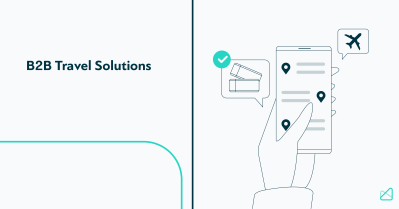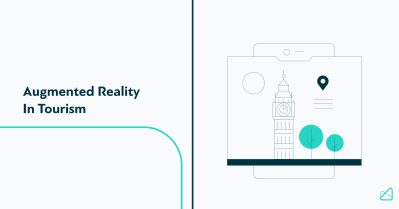What exactly is travel technology? All about this industry game-changer

Technology has become an integral part of our lives, completely changing how we work, shop, eat and spend our leisure time. With just a few simple taps on our smartphone, we can order food, purchase home appliances, make dinner reservations, and much more.
Constant technological advances have even made their way into the travel industry. We can now book hotel rooms, flights, sightseeing tours, and other activities, and plan our entire trips – all from a mobile device.
Technology has revolutionized the way we travel, making our travel adventures more convenient and fun. This massive change in the tourism industry is what we now call travel technology. Let’s take a look at some of these travel industry facts and see how you can benefit from them.
What Is Travel Technology?
In simplest terms, travel technology means using tech to plan trips. It helps travel agencies book trips for their customers, together with airline tickets, hotel accommodation, car rentals, and many other travel-related activities.
Thanks to computerized reservation systems (CRSs) provided by their hotel and airline partners, they can handle everything travel-related in a matter of minutes.
Every reservation system stores and retrieves real-time data, so each travel agent can streamline communication with all the relevant parties.
Travel technology automates bookings, payments, and back-office tasks for travel agencies and enables consumers to make their online bookings without a travel agent.
Hotelmize and similar technology-driven companies and startups are helping the tourist industry implement travel technology. This has been welcomed with open arms.
Travel Tech Definition
Travel tech is the use of IT in the travel, tourism, and hospitality industry.
It is the application of IT and e-commerce solutions in tourism, travel, and hospitality with the goal of automating travel, saving time, reducing costs, and creating a seamless travel experience for consumers, including before, during, and after a trip.
How Is Technology Used in Travel?
We’ve touched upon some general applications of travel technology to help you understand what this game-changer in tourism is. Now, let’s dig deeper into how tech is used in travel.
Here are some of the latest travel technology trends worth mentioning.
Smartphone as a Travel Buddy
Using your smartphone, you can plan a trip completely hassle-free. More importantly, your mobile device can be your tour guide wherever you are.
You can use it to get real-time updates regarding your flight, check in and out of a hotel, and find your way around your travel destination. It can be your map and compass, instantly locating nearby cafes, restaurants, museums, and anything else you need.
Thanks to voice search and virtual assistants like Siri, Alexa, Google Assistant, and Cortana, your journey can be even more convenient and exciting.
AI and Chatbots
More and more online travel agencies and hotels are leveraging AI-powered solutions to automate bookings and provide personalized service.
One example is chatbots. Not only can they provide 24/7 customer support, but they can also make bookings, provide instant answers to FAQs, process payments, and carry intelligent, human-like conversations. They can be an ideal travel companion.
Thanks to machine learning, AI tools also provide insights into consumer behavior, interests, and preferences regarding travel destinations, hotels, amenities, airlines, car rental companies, pricing, and more.
Armed with such insights, OTAs and hotels can display or send relevant offers to customers.
AR and VR
VR (virtual reality) in travel enables you to transport yourself to another location virtually. You can take a virtual tour of a hotel before booking a room or a restaurant before making a dinner reservation.
You can “teleport” yourself into the Louvre, stand on Times Square, cross the Grand Canyon, or marvel at the breathtaking views from Mount Everest. You could watch a hundred videos on YouTube, but VR will make you feel as if you were there.
With AR (augmented reality), you can also take room tours and engage in various hotel facilities.
You can take a peek inside an airplane, make sure your carry-on luggage is the right size, access public transportation schedules, overcome language barriers, and much more.
Internet of Things
Internet of Things (IoT) in travel helps personalize and streamline the travel experience.
For instance, hotels that embrace IoT allow guests to control various internet-enabled devices inside their room with their smartphones. They can control the lights, thermostats, TVs, and more.
Real-Life Examples of Technology Used in Travel
Some of the most notable real-life examples of travel technology include:
- Hotelmize
- Trawex
- Amadeus
- TravelCarma
- Expedia
- Skift
- TechnoHeaven
Hotelmize (mentioned in the What Is Travel Technology? section) is the first on this list. They use capital market trading strategies and financial technologies, as well as travel industry experience, to help profit optimization efforts.
Trawex is a travel software development company that offers global B2B travel technology solutions. Its Trawex APIs seamlessly integrate with any travel portal and enable travelers to make seamless bookings and payments.
Amadeus is a travel technology company that provides solutions to everyone in the travel industry for improving travel experiences. Several years ago, it unveiled Navitaire, a VR travel search, and booking experience.
TravelCarma offers a suite of travel tech solutions for aggregation, distribution, data integration, and custom UI/UX development. It provides travel agency ERP, travel APIs, B2C/B2B booking engines, CRSs, back office, and more.
Expedia is an online travel company where you can book flights, hotels, car rentals, cruises, vacation packages, and plan entire trips.
It also has a chatbot for booking that works on Facebook Messenger, and an Amazon Alexa app with AI voice recognition. There’s also Expedia Travelocity, which has a price-match guarantee.
Skift is yet another great example of travel tech, except it’s a media company. It uses industry intelligence to research and define travel trends worldwide. It’s your go-to source for daily news and insights on travel tech.
Technoheaven is travel technology company that provides travel technology solutions for travel and tourism business to help them manage day-to-day operations and increase business efficiency. These solutions include travel agency software, tour operator software, B2B/B2C Booking Engine, XML API Integration and more.
Impact of Technology in the Tourism Industry: Numbers and Stats
According to FCM Travels, 39% of hotel bookings are made on smartphones. The same study found that smartphones are go-to devices for 22% of flight bookings.
Condor Ferries published some very interesting stats on online travel bookings:
- 70% of travelers use smartphones for travel research
- 33% of travelers plan their trips with the help of a virtual travel assistant
- 82% of 2018 travel bookings were made without a travel agent
- 66% of all travelers make their bookings online
- 83% of consumers in the US prefer making their travel bookings online
- 80% of travelers rely on reviews on TripAdvisor before making bookings
- 72% of consumers won’t make a booking before reading online reviews
Travel technology is definitely on the rise, and the OTA market share confirms that we are slowly going towards a fully-digital future.
How Has Technology Changed the Travel Industry?
Technology has made travel automation possible, making trip planning less time-consuming and exciting for travelers and travel agencies.
You can plan a trip in minutes and easily book accommodation, tickets, flights, and much more. You can have your travel itinerary in the palm of your hand, with your mobile device as the perfect travel buddy.
You can stay connected wherever you are, break down language barriers, and even improve your packing routine with tech such as AR. You can have a personalized experience that makes every trip unforgettable.
Travel technology has revolutionized tourism, and we can’t wait to see what its next chapter has in store for us! It’s undoubtedly going to be brilliant!
Subscribe to
our newsletter
Yay! You are now
subscribed to our
newsletter
Mize is the leading hotel booking optimization solution in the world. With over 170 partners using our fintech products, Mize creates new extra profit for the hotel booking industry using its fully automated proprietary technology and has generated hundreds of millions of dollars in revenue across its suite of products for its partners. Mize was founded in 2016 with its headquarters in Tel Aviv and offices worldwide.
Related Posts

Your Ultimate Guide to B2B Travel Solutions
17 min. You’ve probably noticed that B2B travel solutions play a vital role in the global B2B travel sector. We are talking about the market bound to reach the size of $4952.96 by 2028. That’s a CAGR Growth of 17.51%. No wonder leading B2B travel solutions process over 80.000 bookings and 14.000 searches a day. […]

5 Ways Augmented Reality is Enhancing the Tourism Experience
20 min. Augmented reality (AR) can truly transform the way people discover and explore new places. By combining physical exploration with digital elements, travelers are able to gain deeper insights into different cultures while making memories along the way. In today’s world, more and more travelers are turning to technology to add excitement and convenience […]

Everything You Need to Know About Virtual Tourism Companies
24 min. Virtual tourism refers to a specific tourism niche using technology that enables travelers to experience activities, locations, and destinations without leaving their homes. The types of virtual tours depend on the multimedia format offered to travelers. It can be anything ranging from still images, video, and audio to interactive virtual reality. The popularity […]
